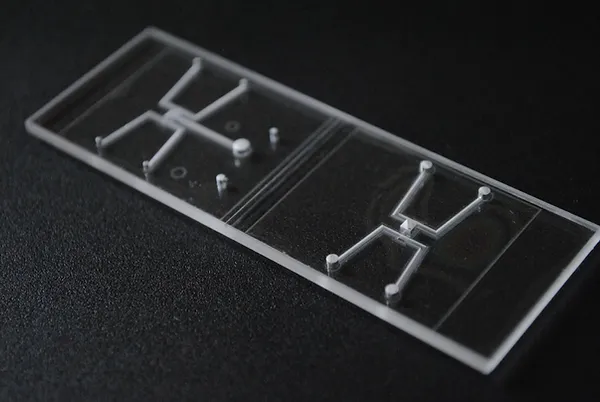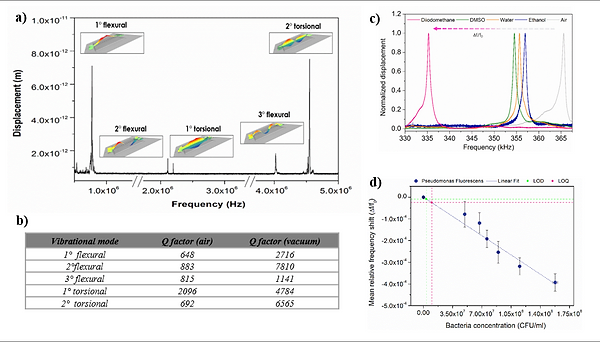Researchers(1) at the Department of Applied Science and Technology of Politecnico di Torino, Italy, have realized an innovative transparent suspended microchannel resonator (SMR)(2) in glass for enhanced biosensing applications, taking advantage of the FEMTOPRINT® 3D printing technology. SMR techniques are powerful real-time monitoring systems to detect mass and density of biomarkers and cells, allowing the characterization and prevention of complex and widespread medical diseases. Other investigations may include bacteria loads in water and raw food materials to potentially prevent food-borne diseases. The developed SMR can achieve impressive mass resolution (10-15 to 10-18 g), enabling label-free detection of single molecules(3,4).

The SMRs’ investigation has brought to the fabrication of complex and tiny features out of glass. Suspended bridges with length of 500 μm and 1000 μm, 80 μm in width and 30 μm in thickness have been made out of fused silica glass with precisions of +/- 1 μm. Fluidic channels with cross-section around 10 μm x 5 μm flowing underneath completed the central part of the chips.
Compared to traditional bulk micromachining technique, the FEMTOPRINT® approach has considerably simplified and speed up the fabrication process. The two-step process composed by laser exposure and selective etching has allowed to release with precision the suspended bridge and to clear the embedded channels, avoiding delicate assembly and alignment steps.
Making SMRs’ with our technology has also improved the chip performances in many ways. Particles flowing into tiny fluidic channels of the resonator reduce external mechanical interferences, like damping and viscous drag, and to directly integrate the microfluidic systems(5), improving the throughput and efficacy of the bioassay. Optical transparency further provides the opportunity to directly monitor the channel inside, paving the way for the integration of optical and microgravimetric characterizations.

The mechanical properties of the resonator were studied analysing the first five vibrational modes, extracting the related frequency, clearly visible from the vibrational spectrum reported in the following figure a), and evaluating the quality factor of the different modes both in vacuum and air environment (figure b). The stability of the resonator was estimated characterizing the oscillation noise of the first resonance mode measurements by means of the Allan’s deviation σA(τ) analysis. The frequency inaccuracy varied from 1.7 to 0.9 parts per million corresponding to an average frequency noise of 0.48 Hz.
In order to define the mass sensitivity of the glass resonator a calibration curve was built by correlating the frequency response in function of the density of different fluids flushed inside the suspended microchannel (figure c). The measurements revealed a density sensitivity of 8.95 Hz/kg/m3 and a resolution of 0.05 kg/m3, comparable to state of art SMR density sensor(6,7,8). Once the device was mechanically characterized, the effective biosensing capability of the glass SMR has been demonstrated by evaluating the microbial load of aqueous solutions containing different concentrations of P. fluorescens (figure d).

References:
1. R. Calmo et al., Politecnico di Torino
2. N. Cermak et al. Nature biotechnology, 2016, 34, 1052-1059
3. J. Lee et al., Nano Letters 2010, 10, 2537–2542
4. T. P. Burg et al., Journal of microelectromechanical systems, 2006, 15, 1466-1476
5. T.P. Burg et al., Physical review letters, 2009, 102, 228103
6. O. Malvar et al., Sensors, 2015, 15, 7650-7657
7. M. F. Khan et al., Sensor and Actuators B:Chemical, 2013, 185, 456-461
8. D. Lee et al., Scientific Reports, 2016, 6, 33799